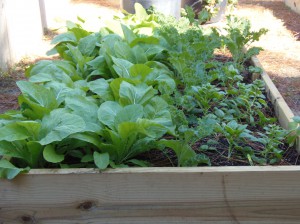Backyard gardens have increased in popularity the last few years, with record calls to Extension offices statewide on how to grow tomatoes and preserve produce. Along with the boom in home gardening, schools have steadily added gardens to their campuses. There are countless benefits to including children in growing their own food. Personal experience and numerous studies have shown that children improve their attitude towards fruits and vegetables and are more likely to try new foods if they’ve helped grow it themselves. Urban-dwelling youth find a safe place to interact with nature, increase their awareness of where food comes, and learn to be responsible for a living thing. Youth of all ages can gain critical math and science skills from measuring, planting, observing and problem-solving. Even toddlers enjoy scooping up soil, holding worms, and seeing the growth of a tiny seed or plant over time. Any veteran gardener will tell you that the fresh air and physical work improves their health and mental outlook.

This raised bed garden is used at the Roy Hyatt Environmental Center to teach youth about gardening and provide food for numerous animals housed at the center. Photo credit: Molly O’Connor
School gardens are being used around the country to achieve all of these objectives, including intangible skills such as teamwork, confidence, and patience. The utility of gardens for lessons on art, poetry, creative writing, and music should not be underestimated; countless writers and artists have been inspired by the natural world.
Across the country, Extension programs, Master Gardeners, and 4-H staff are lending their gardening expertise to schools and learning centers from preschool to the University level. The Junior Master Gardner 4-H program is an excellent hybrid between horticultural and youth education, and is set up with curriculum and lessons for working with kids in both a classroom and field setting. The Florida Ag in the Classroom “Gardening for Grades” program has curriculum for elementary through high school levels correlated with state standards and ready to go for a classroom. Youth study soil structure, chemistry, botany, environmental science, agriculture, meteorology, and wildlife ecology in an engaging, hands-on way. In-service training workshops are held periodically to prepare teachers for beginning and teaching from a school garden, so ask your local Horticulture or Agriculture agent about these programs.
Typically, backyard gardeners, schools, or Scout groups will create a raised-bed garden, which reduces weeds and water needs and allows for easier control of soil type and maintenance. Guidelines for raised bed gardens, for home or educational institution, are available here.
Vegetable gardens aren’t the only teaching tool in the horticultural world. Butterfly and wildlife gardens are (pardon the pun) perennially popular, and are typically easy to implement. Youth may learn valuable lessons on food webs and insect life cycles in addition to the soil and botanical information. For more information on the benefits of gardening with youth, visit the UF school garden site or contact your local horticulture Extension agent.
- The Assassin Bug–A Beneficial Garden Visitor - January 15, 2026
- Wax Myrtle–a Native Evergreen - December 26, 2025
- Yucca–A Tough and Versatile Native Plant - November 26, 2025
